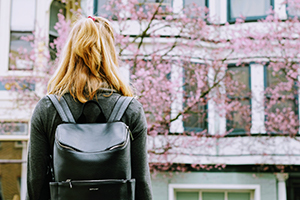Safety in Canada

Canada is widely regarded as one of the safest places in the world to live. It is still important to follow the same common sense safety precautions in Canada that you would anywhere else in the world. Your safety is your number one priority.
In an Emergency
If you are in trouble or witness to a crime, do not hesitate to call 911. This is a central number for police, fire, and ambulance throughout Canada. Interpreters are available if your first language is not English. If you are robbed, do not try to argue or fight, and if you are assaulted, shout or blow a whistle to attract attention to your situation. Try to protect your body and distract the attacker so that you can escape. If the attacker asks for your purse or wallet, instead of handing it to them, throw it and run in the opposite direction.
If you are a victim of a crime, no matter how small, report it to the police.
Transportation Safety
Before leaving for your destination, make sure you are familiar with your bus route and schedule. Alternatively, taxis are a good way to get home when it is late and dark. Keep the number for a taxi company on hand, just in case. Canadian taxis should all have running meters showing the cost of the ride. Drivers will not try to negotiate a price with you.
Along with the classic taxi, rideshare in Canada is nearly as prevalent as it is in the US. Uber might be the most popular option worldwide, but some savvy startups have given Canada riders more options including but not limited to:
- Kangaride
- Poparide
- Lyft
- Carma Carpooling
Availability of each of these services will vary upon the location you’re in. Research which options exist in the province you’re in. Rideshare is generally the most economic option of traveling by vehicle, and certainly is the safe alternative to driving under the influence. Be sure to partake responsibly!
Many public transportation systems also offer special assistance for those traveling alone at night. When taking the bus, make sure you know your route and bus schedule beforehand, and choose busy, well-lit bus stops after dark. Whenever possible, choose a seat up front, close to the bus driver so they can step in if someone is harassing you. Don’t be afraid to switch seats if someone is making you uncomfortable. Your comfort and safety is more important than avoiding being seen as rude. During late hours, try asking your bus driver to stop at the street closest to your destination, so you can cut down on walking alone after dark as much as possible.
Walking Safety
When walking alone, be aware of who and what is going on around you. Avoid walking with headphones in or anything else that might distract you from your surroundings. Some areas might be safer than others. Ask advice for the best routes to take when going out. Always walk on well-lit, busy streets at night, and travel with a friend whenever possible. Avoid isolated areas, such as parks or alleys. If you have to walk alone, walk with confidence, and make sure you plan your route to and from your destination.
Many college campuses offer services such as "safety escorts" and transportation to assist students traveling around campus after dark. It’s a good idea to have the numbers for these services programmed into your phone.
Always tell someone where you are going and when you will return. If you feel that you are being followed, change directions and go to the nearest store, restaurant, or public place. Avoid carrying large amounts of money or weapons. Weapons are illegal in Canada and can be used against you.
Drinking and Parties
Make sure you know the legal drinking age in your province. An ID or passport will be needed in order to purchase alcohol or to enter a bar or club. If you go to a bar, make sure you go with friends to ensure there are people you trust who can help you if you run into any problems. Before you go out, make sure you have a plan to get home that does not involve drinking and driving. This might mean having a friend as a designated driver, taking a taxi, using rideshare, or taking the bus. With the exception of rideshare apps, don’t accept rides from strangers. And when using rideshare apps, always check that the license plate, name and photo of the driver, and vehicle description match the one you are provided in the app.
Drugs are illegal in Canada and are dangerous. Do not use or possess any. International students caught possessing drugs can be deported. It is also illegal to drink alcohol in public places such as parks, beaches, cars, or on the street. Be wary of what could jeopardize your ability to study in Canada.
Apartment Safety
Don't let people you don’t know into your apartment building or dorm room. If you aren't expecting maintenance or a delivery, refer them to the building manager. This also means not holding the door open for people you don't know. This might feel rude, but your safety while in Canada and the safety of your neighbors or roommates is more important. Don't prop doors open with the floor mat or other blocks, as this can allow strangers to enter the building unannounced. Always lock your doors and windows, even when you’re at home, and look through the peephole before you open your door for someone. It’s also a good idea to get to know your neighbors, so you will have people around who can help you in an emergency.
